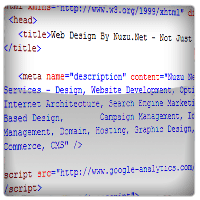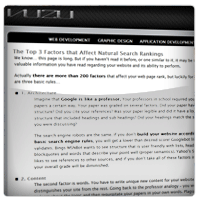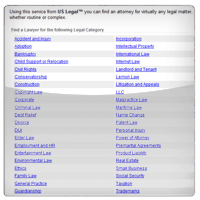
The Top 3 Factors that Affect Natural Search Rankings
![]() We know… this page is long. But if you haven’t read it before, or one similar to it; it may be the most valuable information you have read regarding your website and its ability to perform.
We know… this page is long. But if you haven’t read it before, or one similar to it; it may be the most valuable information you have read regarding your website and its ability to perform.
Actually there are more than 200 factors that affect your web page rank, but luckily for all of us, there are three basic rules…

-
Trust
Search Engine Optimization has always a moving target. The search engines want to provide the best results possible, so they are constantly tweaking settings and adding functionality to make the results better. One of the biggest things they do is fight web spam. Most of the major changes we have seen in updates like Panda, Penguin and now Hummingbird include updates that aim to nullify the effects of search spamming techniques. The rules have also changed over time and within the past couple of years, they (Google especially) have found ways for webmasters to create trust signals as content providers. With additions like Google+ authentication and schema.org markup, we now have the ability to tie our authors directly to their content. Contextual markup allows search engines and other providers to better understand what our content is about and make use of it within the knowledge graph.
So trust is an addition and now makes 4 major factors. The original three follow and they still apply:
-
Architecture
Imagine that Google is like a professor. Your professors in school required you to write papers a certain way. Your paper was graded on several factors. Did your paper have the proper structure? Did you cite your references? Was your paper legible and did it have a logical structure that included headings and sub headings? Did your headings match the subject matter you were discussing?
The search engine robots are the same. If you don’t build your website according to some basic search engine rules, you will get a lower than desired score! Googlebot likes code that validates. Bings MSNBot wants to see structure that is user friendly with lists, headings, block quotes and words that describe your point well (proper semantics). Yahoo’s Searchbot likes to see references to other sources, and if you don’t take all of these factors into account… your overall grade will be diminished.
-
Content

The second factor is words. You have to write unique new content for your website. This distinguishes your site from the rest. Going back to the professor analogy – you were required to learn about the topic and then regurgitate your papers in your own words. Plagiarizing is of course, a big no-no. Same goes for your website. You cannot copy other content from the Internet verbatim without sourcing and possibly linking back to that content. Ok… so technically you can… but you will not rank in the search engines if you do.The search engine crawler (robot) comes through your site and finds a new paragraph/page of content. It then takes that content and evaluates its semantic structure and words. It then compares it to all of the content currently in the index (which is a lot!). If it finds a duplicative quotient between 60-80%, depending on the search engine, it will deem the content as duplicate. This significantly devalues the page in the search engine’s mind. That page will not rank highly because it is not recognized as the original source of the information. So… write unique content and reference your sources!
Ahem… and don’t try and cheat. Just like in school – if you use nefarious activities to try and get better grades (boost your rankings), your site may get marked as spam or banned. Yes, there are several ways to cheat, but just like real life… the shortcut may be good in the short term, but it is a poor long term strategy. Real Unique Content is KING!
What kind of content should you have on your site? Imagine you sell light bulbs. You know that you are the only one that builds and sells the best, most energy-efficient light bulbs in the world. You have a great new website that has lots of content about the technology and process you use to build these bulbs. But your sales are pitiful. Why? Because the words on your website don’t match what a user is searching for when they are researching new light bulbs!
So, how do you find out what your potential customers actually search for when they are looking for products like yours? Up-front keyword research is one of the most important things you need to do before you construct a site. Matching your website to your customer expectations and search patterns may be one of the most important factors of your success. Especially if you are a small biz and don’t have the big marketing bucks to pay for a TV ad educating your customers the way you would like them to look for your product.
Often your website structure is dramatically different when you find out the best way to speak to your audience. Keyword/Keyphrase research is another way to gain competitive advantage because most web geeks don’t know the right way to build an Internet business from A-Z.
-
Votes

The third ranking factor is votes… also known as links. Every single link on your page is a vote for the page you are pointing to. This includes both internal links (links to other pages on your site) and external links (links to other websites). Remember how the search engines like you to point out your references? Every time you link out to a reference, you are helping that page.Several strategies can be employed to develop links from other websites. This is the most difficult and process-intensive part of owning a website. Link campaign strategies abound, but the basic principals are to have great unique content that follows all of the rules, and also entices the reader to engage in discussion. Web 2.0 is about social interaction and the ability to have a two-way conversation with your readers/prospects/customers.
On top of the actual link itself are the words used in the link text and the surrounding paragraphs. Going back to the upfront keyword research – you need to build your links using the phrasing that your users search.
These points should lead you to taking a critical look at your website, your rankings and your sources of traffic. If you don’t know where to find this data you should get in touch with us and we’ll help you. We offer a free Website & Internet Marketing diagnostic that points out the big issues and several key small ones that can help your website perform at its greatest potential.
As a disclaimer… You should know that getting and keeping a page ranked in the search engines in an inexact science. There are too many factors at play to understand, measure and guarantee page performance. The search engines don’t want you or us to understand fully, that way we web masters can’t easily game the system.
Here are a few of the other factors that affect ranking: domain age, content relevance, changes to the algorithm (Google made 420 changes in one year – that is more than 1 per day!), time relevance, competitive landscape, subject area… and the list goes on.
So What Should You Do Now?
The first step is understanding how important search rankings are for your website. Congratulations… if you have read this far you are there! The second step is to perform an audit to check out what issues need to be addressed and to set the baseline for your site’s performance. Then you – hopefully with our help, will make the necessary changes to improve your architecture and content. So get in touch with us now… we will make the process easy for you!
In Our Toolshed



